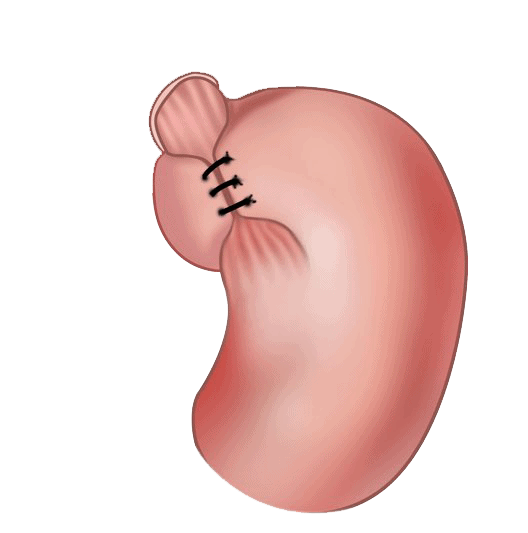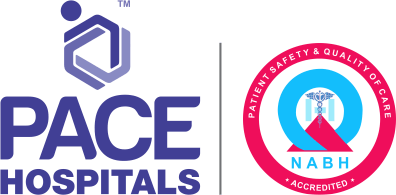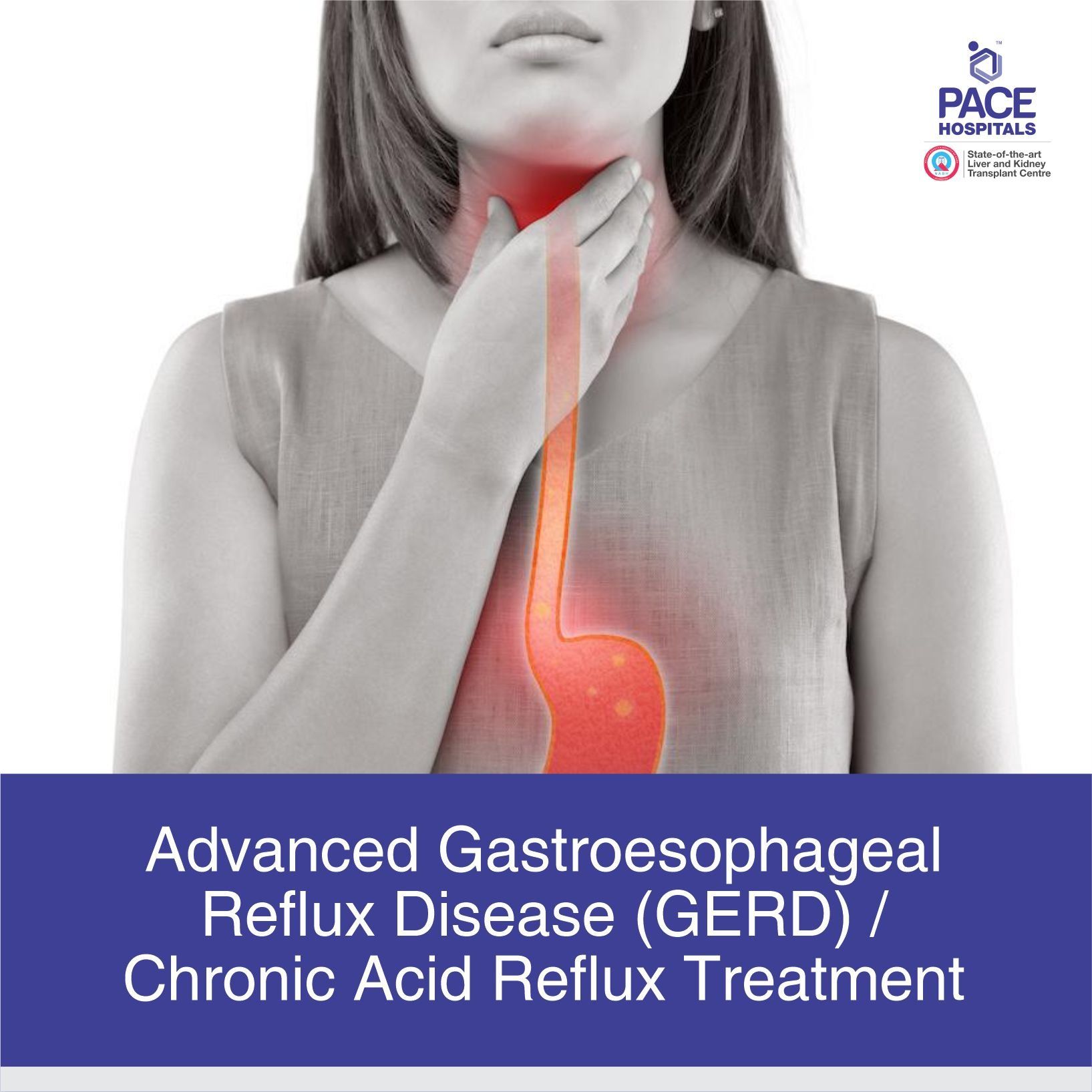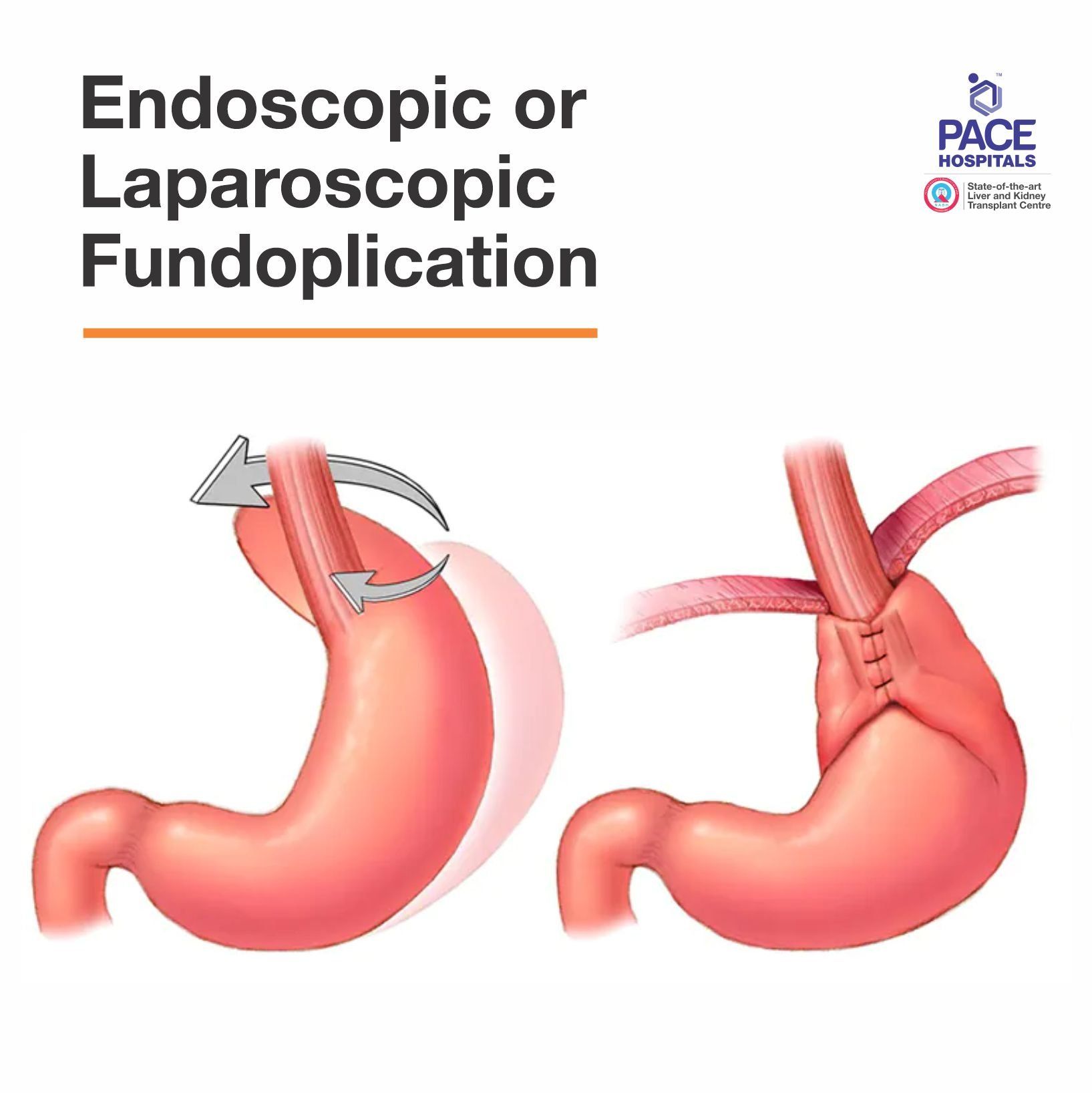Best GERD / Chronic Acid Reflux Treatment Hospital in Hyderabad
Our team of Medical and Surgical Gastroenterologist are expert in treating Gastroesophageal reflux disease (GERD) / Chronic acid reflux / Heartburn and its complications such as
- Esophageal stricture (Narrowing of the esophagus)
- Esophageal ulcer (An open sore in the esophagus)
- Barrett's esophagus (Precancerous changes to the esophagus)
- Esophageal cancer which affects a small portion of people with Barrett’s esophagus.
Request an appointment
GERD Appointment Enquiry
Thank you for contacting us. We will get back to you as soon as possible
Regards
Pace Hospitals
T: 04048486868
Whatsapp: 7842171717
Oops, there was an error sending your message.
Please try again later
Regards
Pace Hospitals
T: 04048486868
Whatsapp: 7842171717
We are one of the Advanced GERD / Chronic Acid Reflux Treatment Hospital in Hyderabad, having branches at Hitech City and Madinaguda and backed up with team of interventional medical and surgical gastroenterologists, transplant surgeons, and paramedical staff, psychologist and physical therapist.
Gastroenterology department at Pace Hospitals equipped with “The World’s First Universal Surgical Robotic System”, State-of-the-art facility and latest technology offering comprehensive diagnostics and therapeutic treatment for Gastroesophageal reflux disease (GERD) / Chronic acid reflux and its complications.

Endoscopic fundoplication and Open / Laparoscopic Nissen fundoplication in GERD management
Our Gastroenterology department is equipped with high-end diagnostic endoscopy equipment, 24 hour esophageal pH metry, the latest imaging and radiology services offering diagnosis of GERD and severe malignancy like Barret’s esophagus, diagnosis of peptic stricture of esophagus.
Our team of doctors are experts in doing therapeutic procedures like Endoscopic Full Thickness Plication (GERD-X), Anti-reflux mucosectomy (ARMS), Anti-reflux mucosal ablation (ARMA), Endoscopic fundoplication - Transoral incisionless fundoplication (TIF), Transesophageal endoscopic therapies, Endoscopic stitching to tighten the sphincter muscle, and Open / Laparoscopic Nissen Fundoplication.
Top Medical and Surgical Gastroenterologist Doctors in Hyderabad - Hitech City and Madinaguda
-
Dr. Govind Verma
Book appointmentInterventional Gastroenterologist, Hepatologist & Endosonologist
-
Dr. Phani Krishna
Book appointmentSurgical Gastroenterologist and Liver Transplant Surgeon
-
Dr. M Sudhir
Book appointmentSenior Gastroenterologist
-
Dr. R Venkatesh Reddy
Book appointmentGastroenterologist & Hepatologist
-
Dr. Suresh Kumar S
Book appointmentSurgical Gastroenterologist and Laparoscopy Surgeon
Testimonial: Mr Sk aged 30 suffered with severe GERD was having chronic acid reflux, heartburn, chest pain, belching and volume reflux for more than 5 years severely affecting his quality of life. Now 5 years post Laparoscopic Fundoplication he is completely free and doing well.
GERD - Frequently Asked Questions
-
What is GERD disease?
Gastroesophageal reflux disease (GERD) or chronic acid reflux is a long-term condition where acid from the stomach comes up into the esophagus, a muscular tube connecting the stomach with the throat (pharynx). Flowing back up acid into the esophagus causes irritation to the esophagus lining.
GERD is the chronic form of heartburn and acid reflux. If you have symptoms of acid reflux more than twice a week, you might have a condition known as gastroesophageal reflux disease (GERD).
Read More: Gastroesophageal reflux disease (GERD) - Symptoms, Causes, Diagnosis and Treatment
-
What are common symptoms of GERD?
Acidic taste in mouth, Heartburn (usually after eating, which might be worse at night), Regurgitation of food or sour liquid, Sensation of a lump in your throat are the most common symptoms of Gastroesophageal reflux disease (GERD).
Pain with difficulty swallowing, bloating, gas and belching, chest pain, increased salivation, nausea, bloating, gas and belching, chronic cough, new or worsening asthma are less common symptoms.
-
When GERD was first discovered?
In 1925, the classic symptoms of GERD were first described, when Feldman and Friedenwald commented on heartburn and its possible relationship to a hiatal hernia. In 1934 gastroenterologist Asher Winkelstein described acid reflux and attributed the symptoms to stomach acid.
-
Can GERD cause fever / shortness of breath / blood in mucus or heart attack?
Directly GERD cannot cause fever, but if there is an aspiration into the trachea (windpipe, it is the passage leading from your pharynx to the lungs) and the lungs, it can cause aspiration pneumonitis / aspiration pneumonia and cause fever. And again, shortness of breath can also occur because of aspiration pneumonitis. There's actually a chance of blood in the mucus because of repeated vomiting and retching due to that some sort of a tear in the lower oesophageal region as well as the sphincter area. Then it can lead to some sort of streaky hemoptysis. Of course there's no correlation or relation with GERD and heart attacks, but it can mimic. GERD causing pain in the chest can mimic a heart attack, but it doesn't cause a heart attack and reverse also heart attack can mimic like a GERD so both should be screened and diagnose properly.
-
Is GERD associated with pancreatitis?
There is no connection or relation between the GERD and pancreatitis both are independent disease and conditions. Because pancreas is far away as well as lower esophageal sphincter in the upper part of the gut. So there's no connection with GERD and pancreatitis.
Read More: Pancreatitis - Acute and Chronic: Symptoms, Causes and Treatment
-
Why GERD happens?
This is mainly because of the structural abnormality of the lower esophageal sphincter. When the lower esophageal sphincter doesn't contract after each meal there will be relaxation of the sphincter and the reflux of the acid from the stomach continuing to the esophagus. Apart from that, the angle of insertion into the stomach as well as the amount of time it is taking to get clear from the esophagus. All these causes GERD.
-
Is GERD dangerous and can it cause cancer?
GERD basically is not dangerous, but the complications of GERD are dangerous because the repeated GERD or chronic acid reflux can cause aspiration, aspiration pneumonitis, severe shortness of breath and admitting into an ICU also, and a longstanding complication, is constant exposure to the stomach acid can lead to changes in the lower esophageal as well as the sphincter and lead to Barrett's esophagus and sometimes lead to malignancy. So this is a dangerous complication because cancer is one of the known complications of GERD, those percentages are less. Apart from that, repeated reflux can also cause stricture formation in the esophageal region.
-
How to treat / cure GERD permanently?
GERD as we know the structural defect is there. It is not a continuous ongoing treatment. Medically, following the diet restrictions like avoiding fatty foods, fried foods, oily foods, spicy foods, smoking and alcohol consumption. Apart from that we have a proton-pump inhibitor which can also help reducing the reflux and the acidity of the area. But this is not permanent because there simply taken continuously.
Anatomical deformity has to treat and corrected surgically or endoscopically. There are some techniques like fundoplication and set a technique where you know we break the esophageal sphincter and then wrap up the lower esophageal sphincter region by the stomach fold. This helps in curing it permanently.
-
How long does GERD take to heal?
By active treatment as well as by strict diet restriction, it takes only two weeks for it to heal, but it has to be maintained continuously by following the dos and don’ts of GERD.
-
What to eat and not to eat if you have GERD?
Avoiding smoking, alcohol consumption and chewing tobacco and then the spicy foods, citric acid fruits, oily foods, ginger, garlic and heavy food consumption, fried things, and junk foods should be avoided.
So these things if you avoid the rest of the foods can be taken. In GERD we have to take small, closely spaced meals in place of large meals. So eating five times in a day and avoid lying down after food for two hours these main things can prevent chronic acid reflux due to the GERD.
Read More: 8 foods to avoid with Acid Reflux and follow healthy lifestyle
-
What is the difference between a hiatal hernia and GERD?
Hiatal hernia is a displacement of the gastroesophageal junction from the abdominal cavity into the thorax and chest, whereas GERD is a relaxed abnormal laxity of the lower esophageal sphincter. So GERD can be there without hiatal hernia, but hiatal hernia will always have GERD. And if when a GERD patient is having hiatal hernia then the reflux symptoms are much more severe, and that actual medical treatment is almost similar. But surgical treatment, it was much more helpful for the hiatal hernia, because the hiatal hernia is pulled down and then there's a fundoplication and preventing the hernia to go up as well as also controlling the GERD.
Why Pace Hospitals?
- 150+ bedded super speciality hospital, CGHS & ISO accreditation.
- NABH and NABL accreditation.
- State-of-the-art Liver and Kidney transplant centre.
- Empanelled with all TPA’s for smooth cashless benefits.
- Centralized HIMS (Hospital Information System).
- Computerized health records available via website.
- Minimum waiting time for Inpatient and Outpatient.
- Round-the-clock guidance from highly qualified surgeons and physicians.
- Standardization of ethical medical care.
- 24X7 Outpatient & Inpatient Pharmacy Services.
- State-of-the-art operation theaters.
- Intensive Care Units (Surgical and Medical) with ISO-9001 accreditation.
Request an appointment
or Call us at 04048486868
Our Locations
Subscribe to our newsletter and stay updated with the latest health information.
By clicking on subscribe now, you accept to receive communications from PACE Hospitals on email, SMS and Whatsapp.
Subscribe to PACE Hospitals News
Thank you for subscribing. Stay updated with the latest health information.
Oops, there was an error. Please try again submitting your details.
-

Payment in advance for treatment (Pay in Indian Rupees)
For Bank Transfer:-
Bank Name: HDFC
Company Name: Pace Hospitals
A/c No.50200028705218
IFSC Code: HDFC0000545
Bank Name: STATE BANK OF INDIA
Company Name: Pace Hospitals
A/c No.62206858997
IFSC Code: SBIN0020299
Scan QR Code by Any Payment App (GPay, Paytm, Phonepe, BHIM, Bank Apps, Amazon, Airtel, Truecaller, Idea, Whatsapp etc)
Call us at 04048486868
ADDRESS
PACE Hospitals
Hitech City : Beside Avasa Hotel, Pillar No. 18, Hyderabad - 500081
Madinaguda: Mythri Nagar, Beside South India Shopping, Madinaguda, Hyderabad - 500050
QUICK LINKS
Disclaimer
General information on healthcare issues is made available by PACE Hospitals through this website (www.pacehospital.com), as well as its other websites and branded social media pages. The text, videos, illustrations, photographs, quoted information, and other materials found on these websites (here by collectively referred to as "Content") are offered for informational purposes only and is neither exhaustive nor complete. Prior to forming a decision in regard to your health, consult your doctor or any another healthcare professional. PACE Hospitals does not have an obligation to update or modify the "Content" or to explain or resolve any inconsistencies therein.
The "Content" from the website of PACE Hospitals or from its branded social media pages might include any adult explicit "Content" which is deemed exclusively medical or health-related and not otherwise. Publishing material or making references to specific sources, such as to any particular therapies, goods, drugs, practises, doctors, nurses, other healthcare professionals, diagnoses or procedures is done purely for informational purposes and does not reflect any endorsement by PACE Hospitals as such.







